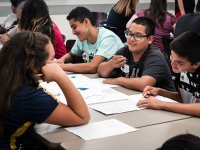Authenticity = Lifelong Learners
For students to care deeply about learning, provide significant content, the opportunity to apply real-world content skills, and an authentic purpose for a real-world need.
Your content has been saved!
Go to My Saved Content.In today's world, lifelong learning is a survival skill if one hopes to successfully navigate the daily challenges and opportunities that present themselves. Yet students tend to see such skills as disconnected from what is taught in schools. Their real-world content begins after completing school assignments like a daily checklist, so that when they leave for the day, they can do what they want.
The irony is that most of the skills and concepts taught in schools can have authentic connections to students' lives and the world they live in. When content coverage is the focus, there is no time for authenticity. But when authenticity is a focus, students develop a deeper understanding of concepts and skills through real-world applications and practice -- which develops lifelong learners.
Developing authenticity can be easy just by following these three steps.
Foundation: Significant content is the core of the work.
Skills and concepts are the foundation for what to learn and for having a real-world purpose. Whether it's a lesson or unit, students' time must be invested in achieving growth in the academic outcomes. Otherwise, the experience is in danger of being fluff and a loss of precious curriculum time. Identify the skills and concepts for learning at the expected level of complexity -- as described by Depths of Knowledge (illustrated in the NYC DOE's video) or the Revised Bloom's Taxonomy.
Level 1: Students apply content skills as used by related professions.
Students need to practice the skills as used by professionals from the field. They need this context of skills to understand real-world usage, because without such connections, the learning outcomes become mere tasks to complete and are soon forgotten. Students who struggle with the abstract concepts will find greater purchase to understanding when they hear, see, and apply the skills in meaningful ways as done by professionals. Some examples include:
- Biology: doctor, nurse, coroner, veterinarian
- Math: caterer, accountant, businessperson, statistician, architect
- English: investigative reporter, blogger, organizer, marketer
- Social studies: archeologist, researcher, politician
Lessons and units providing these experiences can engage students with content in ways that traditional abstract approaches cannot. At this level, scenarios and pretend problems based on real-world issues are used:
- Model United Nations
- Science lab experiments
- Essays written about current-event issues
- Debate process used for contemporary topics
- Solving construction challenges through math
While all of these examples are ways to make authentic connections, they are scenarios. It's only a starting place.
Students are not engaging and exchanging ideas with the actual people and organizations who deal with these issues. Instead, they're presenting to their peers and teacher. If this is all that happens, students eventually relate to scenarios as another level of the game called school. The solution is to recognize that a good scenario is one step from being a great real-world experience.
Level 2: Students address an authentic purpose for a community or client need.
It's a game-changer when students must share their draft ideas, proposals, and solutions with someone from a professional field who actually understands the content. They discover that their voice matters as their ideas are considered based on the needs of a community or client. Here are three levels of rich authentic experiences:
1. Listen to experts from the field.
Experts serve as a resource for data and partners in helping students understand concepts and skills. They might say things similar to what the teacher says, but because they are experts from the field, students will accept the ideas as truly practical. Experts help students build context for the content that they're learning.
2. Engage students in collegial conversations with the experts.
Where listening to experts gives students the passive experience of receiving information, we must also challenge them to research and craft questions that will engage experts for feedback and clarifying concepts. Students share their ideas and proposals for feedback. The results continue the inquiry experience as students do follow-up research and revisions of work based on the dialog. A motivating factor is that the expert or informed client will listen to their ideas and evaluate the final products.
3. Address the needs of a community or client.
Student voice is a powerful component of lifelong learning. Provide students with an authentic purpose for the tasks by having them share the results with a community or client who can benefit from the ideas. Publish the final work to an audience beyond the school. At lower grades, parents can be a focus, but so can museum curators, zoo staff, and new families with young children. For older students, the potential clientele is endless-- they might submit essays to publications or send the resolutions from the Model UN to the appropriate governmental and advocacy organization contacts.
Use video conferencing tools to bring in experts and clients who can participate at any of these levels. They are more likely to participate virtually because coming in person is time consuming and expensive. With tools like these, video conferencing eliminates distance and time:
Lifelong Learners
Authenticity entices students out of "normal" education. They immerse themselves in learning experiences that have greater depth and longer-lasting results. This is not to say that teachers don't already attempt this. However, when the stakes are raised with an authentic purpose paired with experts and clients, students are more likely to invest time in the process. They will pay more attention to the instructional coaching that teachers provide. Why? Student voices matter, and they do not want to let down their authentic clients.
